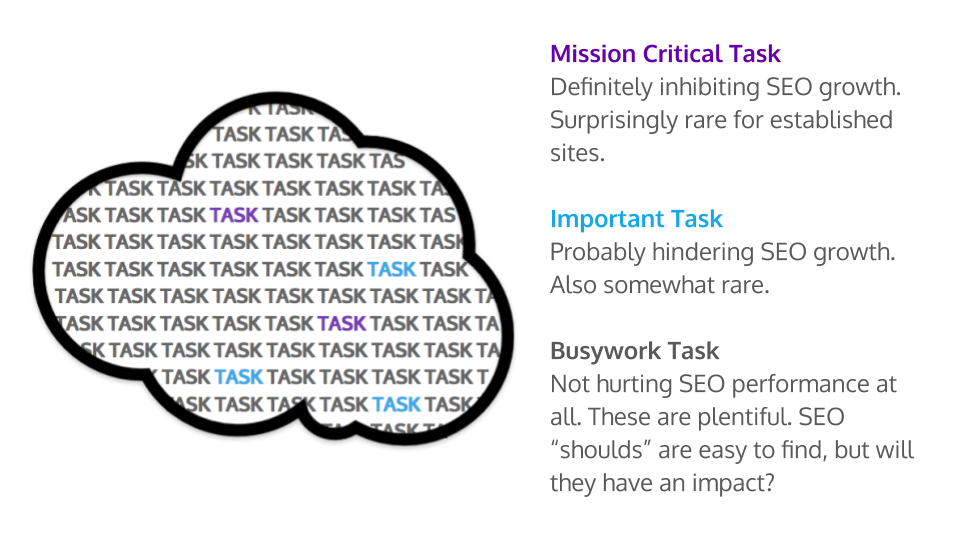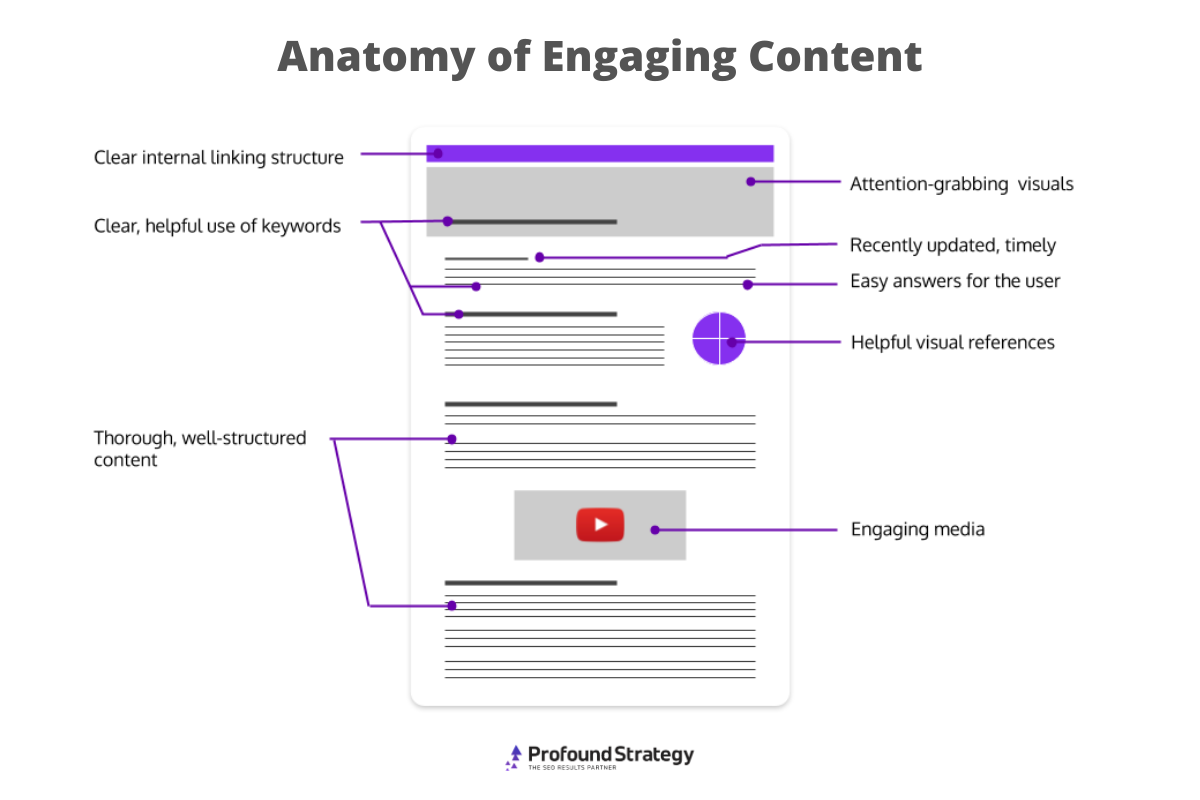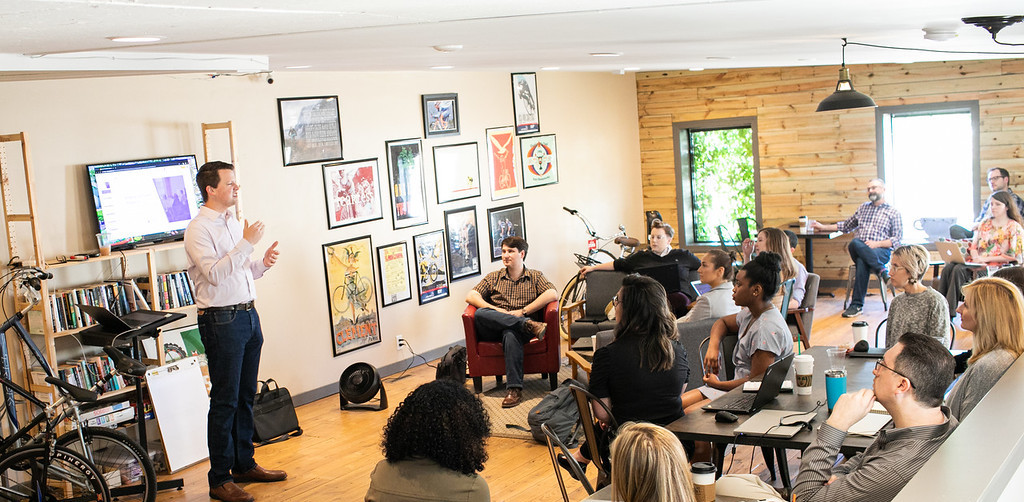SEO Priorities vs. SEO Busywork: How to Identify the Work that Drives Growth
Too many marketing teams are still wasting precious resources on trivial SEO work that will never boost rankings or drive traffic.
How? SEO has changed, but many marketers are still trying to compare audit results and To Do lists against outdated technical and content checklists. Most audits don’t prioritize the technical work that actually impacts SEO growth, and most checklists are simply best practice catch-alls.
That leaves marketers shooting in the dark—hoping that they choose the right tasks to focus on, or with no explanation as to why all their SEO efforts haven’t created growth.
The good news is that you don’t need to catch up on the last five to 10 years of SEO evolution in order to distinguish trivial SEO work from meaningful SEO work. When you learn which technical areas influence growth, how to prioritize UX, and how to think about SEO competitively, you can easily isolate the SEO work that is worth your team’s time (and stop wasting resources on the rest).
Does It Fix a Mission Critical Issue?
It is always possible to create an endless list of technical SEO tasks, but there are really only five categories of technical SEO work that impact rankings and traffic. The first question to ask when diagnosing the importance of a technical SEO task is, “Does it address a mission-critical technical SEO issue?”
Technical best practices are a dime a dozen, but optimizing an SEO strategy requires filtering out what is necessary from what is merely nice-to-have. It’s not always easy to do to—no one likes setting aside a To Do list, and these minor issues often seem bigger than they really are—but your ROI depends on it.
Because you don’t have time and resources to waste, chasing an endless list of technical SEO tasks that are not going to help rankings or organic traffic.

Answering this question gets easier with practice, so stay disciplined. Filter every technical SEO task through this filter first, every time. If the task in question does not address a mission critical issue, save it for a rainy day and move on. Resources are limited; don’t get distracted.
Will It Substantially Improve the User Experience on the Site?
This question is especially helpful as marketers consider individual pages or sections of the site.
What frequently happens, is that marketers set out to improve a specific piece of content or portion of the site structure, and end up getting lost in the weeds. They start to list and consider small tweaks like adding the keyword to more subtitles and image alt texts, adding variants to the intro text, making small code changes, etc.
But the real question to ask when considering changes to a page of content is, “Will these changes substantially improve the user experience on the site?” Will it help users find the information they need, complete their tasks, navigate through the site, etc.?

Making small, (usually) keyword-based usually—at best—merely results in a waste of time and resources. Adding a few more keywords or tweaking some alt text won’t create dramatic improvements in organic rankings or traffic.
At worst, those hyper-focused tweaks could hurt the content and the site’s reach in organic search. Frequently, those updates actually make it harder for users to navigate and use the content, because there are too many keywords in the way.
When content or site structures are optimized for keywords or one-size-fits-all “best practices,” rather than the specific needs of the target audience, user engagement drops. That drop in user engagement has a much greater influence on organic rankings and traffic than whether or not the keyword is included on the page enough.
So when weighing SEO changes and updates on a specific piece of the site, ask, “Are these changes going to create a better experience for my target audience?” rather than, “Do I need more keywords on this page,” etc.
Will It Make the Content More Helpful than Current SEO Winners?
Other websites are currently winning the organic traffic that your content is targeting. Your target audience is using search engines to find answers to their questions and needs right now, and the top three to five organic search results are winning the lion’s share of their attention (and probably their revenue, eventually).
As you consider content and technical SEO updates to specific pages and content assets, take the time to look beyond the brand, at the content that is already winning that space in organic search. Ask if the SEO work that you’re considering for your content is going to make your post or page more helpful to the target audience than what is already winning in organic search.
Effective SEO doesn’t happen in a vacuum, and in recent years SEO has become more of a competition than ever. So if the potential SEO updates or changes will make your content more useful than what’s already at the top of organic search results, you’ve identified good SEO work. If, however, those updates are minor technical or keyword-based tweaks that won’t really help the user, they’re probably a waste of time and resources.
Maximize Your ROI
Effective, modern SEO has grown well beyond content checklists and technical best practices. As you evaluate which SEO tasks are worth your time, remember to stay focused on the end goal: traffic.
If a technical fix or light content update isn’t going to fix a mission critical issue, improve the UX, or make the content more helpful than the organic search competition, it probably isn’t worth your time. It seems wrong, at first, to skip over some tasks—or even some so called “errors”—but the key to maximizing your ROI is diligence.
So go back to your To Do list and ask some hard questions. Find those tasks that really will drive growth, and focus there. You don’t need to waste any more time on the trivial stuff.
What's Next?
Profound Strategy is on a mission to help growth-minded marketers turn SEO back into a source of predictable, reliable, scalable business results.
Start winning in organic search and turn SEO into your most efficient marketing channel. Subscribe to updates and join the 6,000+ marketing executives and founders that are changing the way they do SEO:
And dig deeper with some of our best content, such as The CMO’s Guide to Modern SEO, Technical SEO: A Decision Maker’s Guide, and A Modern Framework for SEO Work that Matters.






